What's the difference between a hotel, motel, and inn?
Confused about the difference between a motel vs hotel vs inn? This detailed comparison guide shows how these lodging types vary in size, price, and amenities so you can find the type of lodging that best fits your needs.
Motel vs Hotel vs Inn: What’s the Difference?
Motels, hotels, and inns are all types of accommodations you might be interested in for your travels, but they all offer vastly different guest experiences.
So what’s the difference between a motel vs hotel vs inn? It comes down to the overall facility size and layout, included amenities, cost, and guest experience.
Before we dive into the detailed comparison showing the difference between a motel vs hotel vs inn, you need a solid understanding of what exactly the terms motel, hotel, and inn actually refer to.
Here’s a look at the different classifications of motel, hotel, and inn.
What Is a Motel?
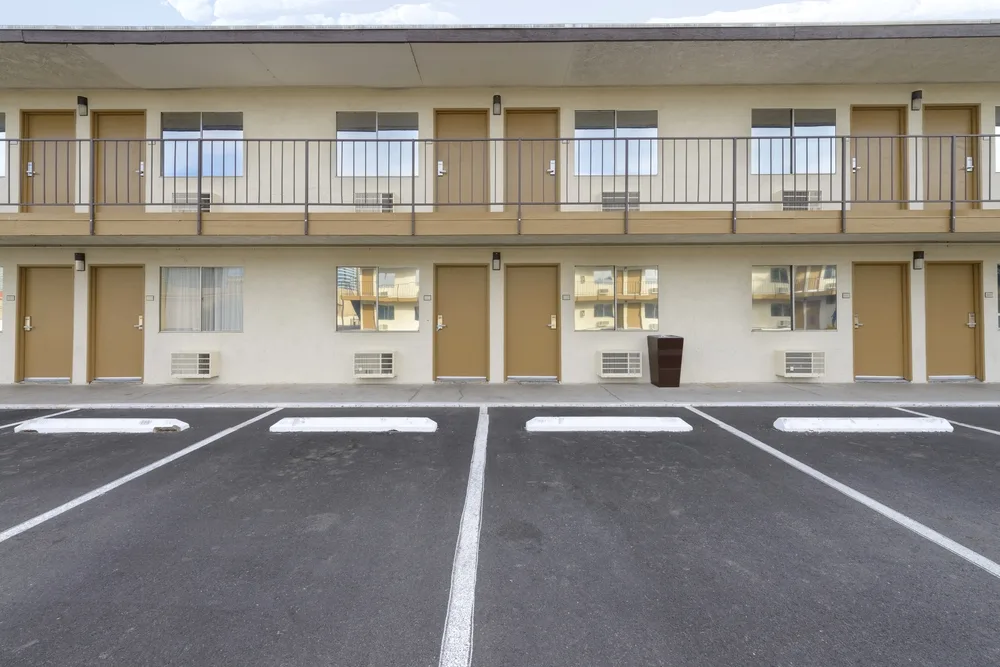
LifetimeStock/Shutterstock
- Most affordable
- Small capacity
- Limited amenities
Motel, short for “motor hotel,” is a small accommodation that’s typically limited to one or two floors of guest rooms. Guest rooms are typically furnished with only basic necessities for an overnight stay and limited amenities are provided.
Motel rooms are usually arranged so each room door opens up to the outside of the establishment, much like a strip mall.
This makes it easy for guests to quickly bring their luggage into the room from a parked car, either on the ground floor or up a flight of stairs to the second floor.
Average Motel Prices
Motels are typically priced affordably, ranging from about $60/night to about $100/night. The overall cost depends on the area and what attractions the motel is close to.
We looked at average Motel 6 prices across the U.S. to show how the nightly rate varies by location:
- Nashville, TN: $64/night
- Denver, CO: $73/night
- San Francisco, CA: $91/night
- New Brunswick, NJ: $93/night
Typical Motel Amenities
Amenities you can expect from motels are limited and basic in nature. Here’s what you can generally expect a motel to provide, though some may offer more or fewer amenities:
- Free Wi-Fi and TV
- Free parking
- Mini fridge and coffee maker
- Air conditioning
- Continental breakfast*
- Outdoor swimming pool*
*Not offered at all motels
What Is a Hotel?
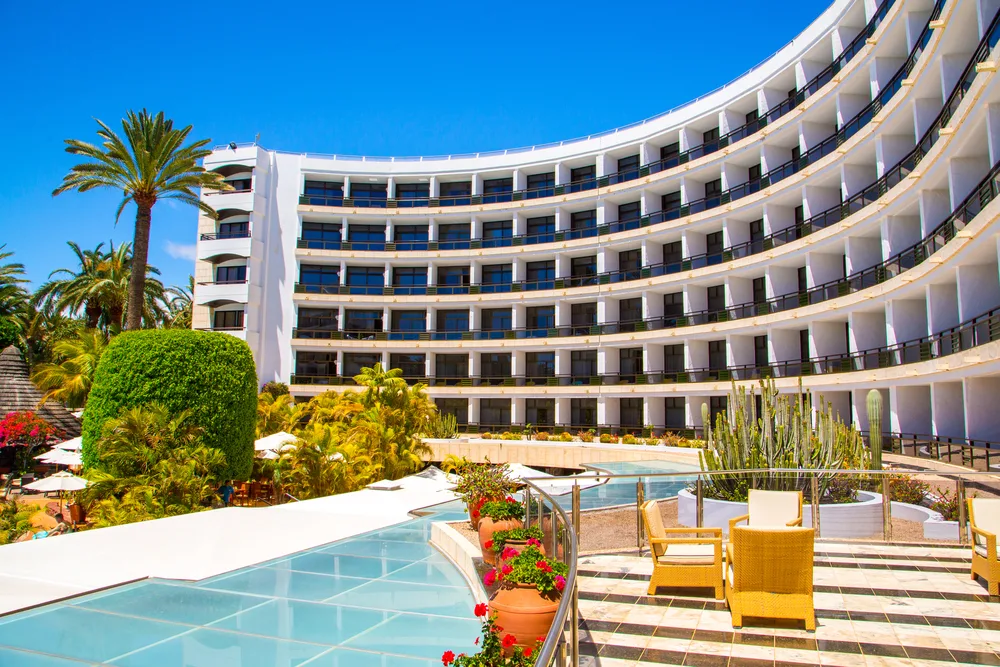
RAW-films/Shutterstock
- Affordable to expensive
- Mid-size to large capacity
- Enhanced facilities and amenities
Hotels are mid-sized to large accommodations that usually feature 100+ guest rooms located on multiple floors with interior access to guest rooms from hallways.
Since hotels are mid-sized or large, they typically contain elevators to help guests bring luggage up to their rooms and easily get to their room without climbing flights of stairs.
Chain hotels and boutique hotels can vary greatly in the types of guest services, personalization, and amenities they provide. Chain hotels are owned by national or international companies and most facilities offer the same amenities.
Boutique hotels tend to have fewer rooms than chains, but are located in desirable downtown districts and often offer a higher level of personalization and individualized services for guests.
Average Hotel Prices
The average hotel price varies widely, ranging from around $100/night to just over $200/night across the U.S. Here’s a look at the average hotel nightly rate in different regions:
- Nashville, TN: $204/night
- Denver, CO: $181/night
- San Francisco, CA: $194/night
- New Brunswick, NJ: $108/night
Typical Hotel Amenities
Hotels offer a wide range of amenities and enhanced facilities that vary according to the price and location. Every hotel will offer basic amenities a motel offers, like air conditioning, a mini fridge, coffee maker, TV, and more.
Hotel facilities typically offer amenities and extras like these:
- Fitness centers
- Spas
- Onsite restaurants
- Conference rooms
- Game rooms
- Room service
- Concierge
- Indoor/outdoor pools and hot tubs
- Continental or buffet breakfast
What Is an Inn?
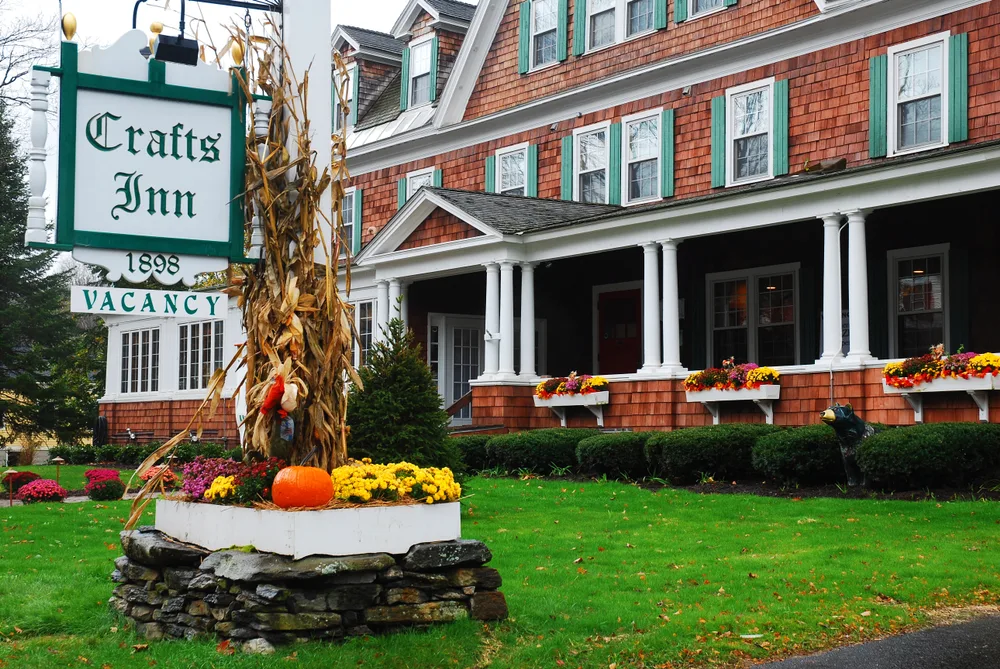
Autumn decorations adorn a country inn in Wilmington, Vermont/James Kirkikis/Shutterstock
- Mid-tier to expensive
- Small capacity
- Varied amenities
Inns are less common than motels and hotels and are a specialized type of accommodation. Historically, inns offered both lodging and food to travelers staying overnight or for a few days.
Today, inns are typically family-owned lodging smaller than hotels (usually no more than 50 rooms or so) and located in more rural areas, sometimes in historic homes. Bed and breakfasts, or B&Bs, are an example of inns.
Note that just because a motel or hotel contains the word “inn” in the name doesn’t necessarily mean it’s a true inn. Consider Comfort Inn, Holiday Inn, and Hampton Inn, which are all actually hotels.
You can expect basic furnishings at an inn, usually done in a historical style or in a way that reflects the location and setting. For example, an inn in New Mexico might be an adobe building with Southwestern decor.
Inns are usually priced in the $200+/night range and have a very small staff that reflects the overall smaller size of the establishment and fewer guest rooms.
Average Inn Prices
Inn prices vary widely due to the different amenity levels, locations, and lodging facilities they offer. Overall, inn prices range from about $215/night to $280/night on average.
Here’s a look at the average nightly rates we found for inns (mostly B&Bs) around the country:
- Nashville, TN: $278/night
- Denver, CO: $269/night
- San Francisco, CA: $215/night
- New Brunswick, NJ: $229/night
Typical Inn Amenities
Every inn has different amenities and facility features that make it unique, so there aren’t many typical amenities that all inns have in common.
For example, a bed and breakfast in rural Tennessee might offer horseback riding with stables on the property while an inn in Napa Valley may offer nightly wine tastings with snacks.
Here’s a list of amenities you might find at inns around the nation:
- Full breakfast served daily
- Communal dining rooms
- Live music or entertainment
- Evening happy hour with refreshments
- Seasonal swimming pool or hot tub
- Gardens, trails, or footpaths on the grounds
Motel vs Hotel vs Inn Comparison
Now that you know what a motel, hotel, and inn are in terms of their size, amenities, and price, let’s compare how these accommodation types differ.
Motel vs Hotel
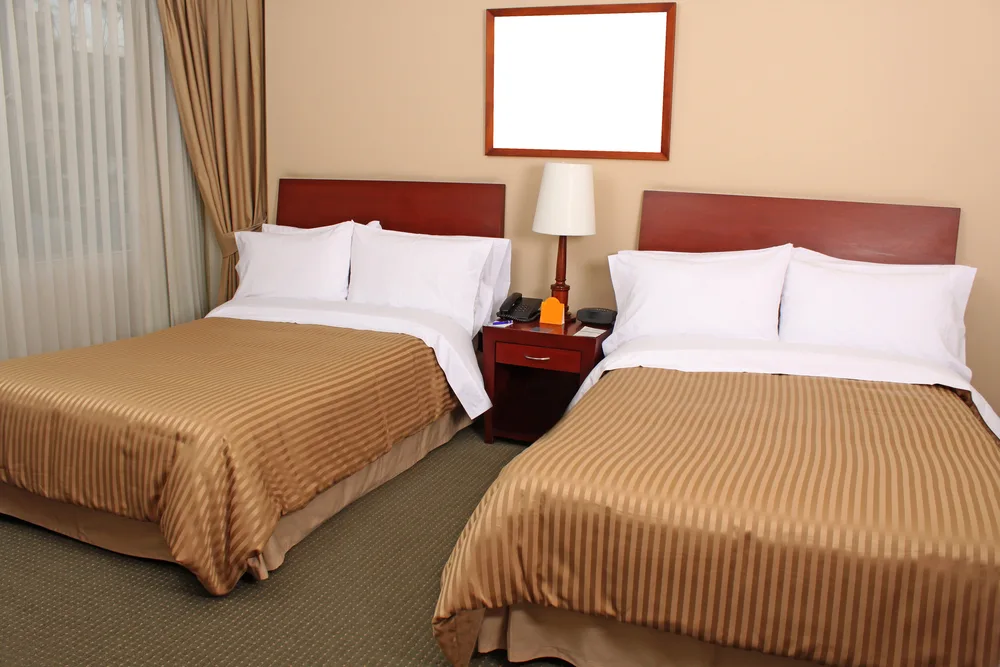
Motel room with 2 queen beds and basic decor/juan carlos tinjaca/Shutterstock
- Motels are cheaper than hotels
- Motels are smaller than hotels
- Motels offer fewer amenities than hotels
They sound similar, but a simple substitution of -m for -h makes a huge difference in terms of the quality and price of your stay.
Motels are always cheaper than hotels with average prices from $60-$100/night compared to $100-$200+/night for hotels. The price is cheaper at a motel because there are fewer guest rooms and amenities provided to guests.
Hotels have a larger overall size with 100+ guest rooms, offer more amenities for guests, and enhanced facilities with extras like fitness centers, swimming pools, conference rooms, and spas.
Motels must be entered from the exterior of the establishment with each guest room door leading directly to the outside. Hotels can be entered from the interior hallways of the hotel, which can be safer for guests.
Hotel vs Inn
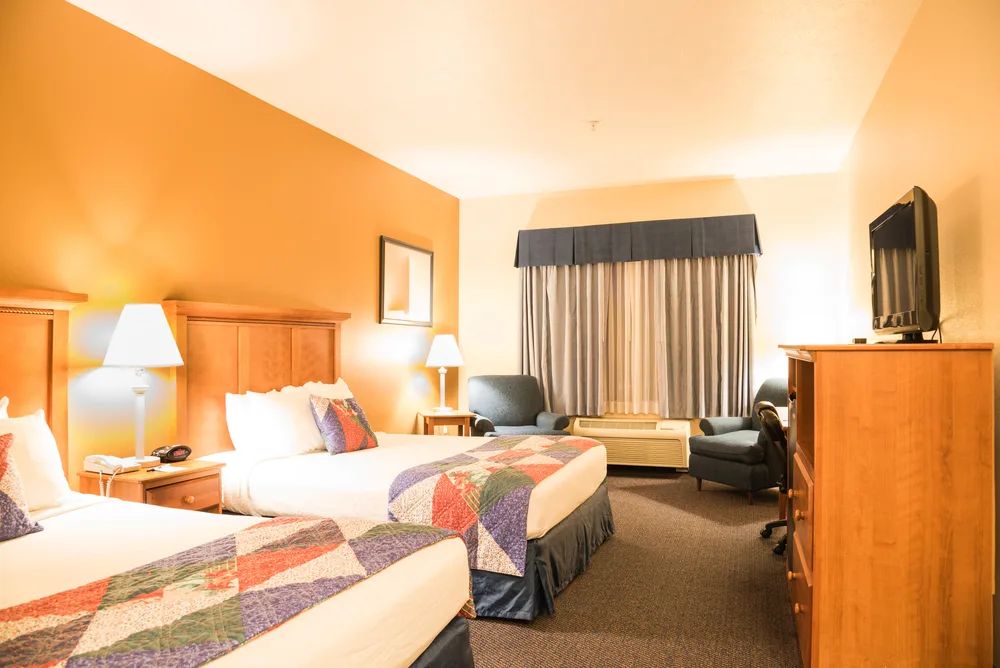
Hotel room interior with 2 king beds/Trong Nguyen/Shutterstock
- Hotels are larger than inns
- Hotels and inns may be similarly priced
- Hotels offer more amenities than inns
Hotels and inns both offer a higher-tier guest experience than motels with enhanced amenities and services for guests that motels don’t offer. But hotels are usually bigger than inns and have the edge when it comes to guest amenities.
Inns and hotels can be priced similarly, but inns are usually more expensive than hotels on average with nightly rates ranging from $215-$280/night around the country. Hotels cost $100-$200+/night by comparison.
Inns offer special, personalized guest amenities like an included full breakfast in a communal dining room and nightly cocktails with snacks. But hotels offer more amenities overall with fitness centers, spas, and onsite restaurants or shops.
Inns have fewer rooms than hotels and may only be able to serve 10-50 guests at a time. Hotels can have 100+ rooms and offer better booking availability than inns.
Motel vs Inn
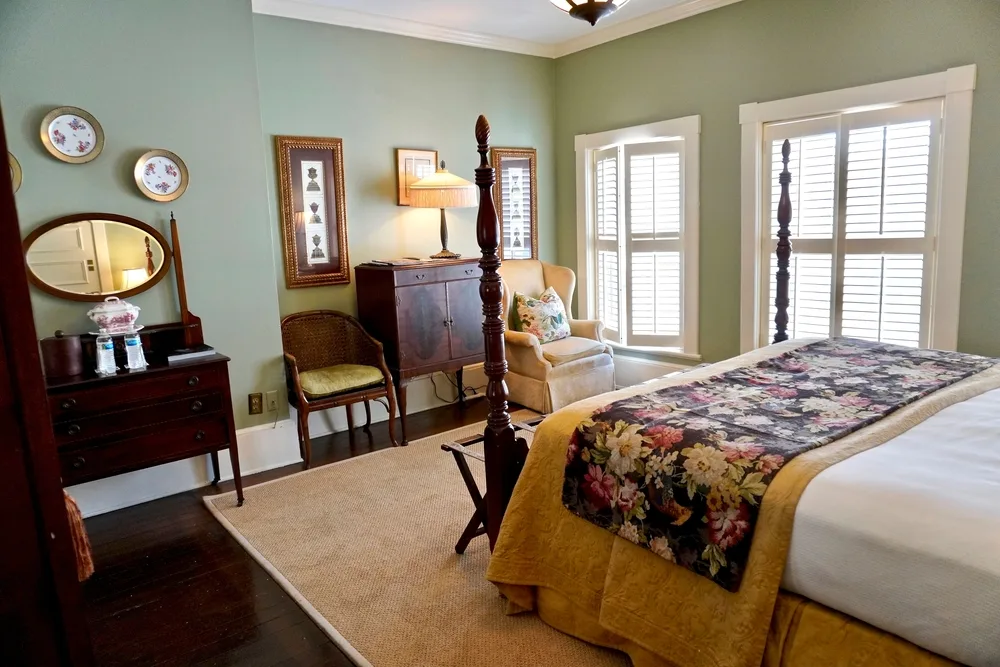
The Ballastone Inn (founded 1838) mansion luxury inn in the Savannah, GA Historic District. Mary Musgrove room in 2021/EWY Media/Shutterstock
- Motels are cheaper than inns
- Motels and inns may be similar in size
- Motels offer fewer amenities than inns
Motels and inns are similar in their capacity because they can serve fewer guests than hotels, but they are very different in terms of price, guest experience, and amenities.
Motels are cheaper to stay in than inns and don’t offer as many amenities. Motels can cost $60-$100/night on average, while inns charge closer to $215-$280/night.
The smaller overall size of motels, the lack of provided meals and entertainment, and the less-personal guest experience make motels more affordable.
Inn rooms may be more like comfy guest rooms in a home than motel or hotel rooms. The decor is often locally or historically themed unlike the generic decor in a motel.
Staying at an inn or B&B usually provides a more personal feel, with the guest being treated like a houseguest or family member rather than an anonymous traveler.
Things to Consider

VTT Studio/Shutterstock
When you compare a motel vs hotel vs inn, there’s a lot to think about. Here’s a summed-up look at the differences between these accommodation types and when to choose each one for a trip.
- If budget is your top priority, stay in a motel. Motels are always the cheapest type of accommodation you can stay in and you’ll be able to find nightly rates around $60 or less in some cities. If you’d rather put your trip budget toward activities, meals, and entertainment, you can save a lot by staying in a motel.
- If experience is your top priority, hotels and inns are best. If you want the comfiest beds, most amenities, cleanest facilities, and best guest service, you’ll want to choose a hotel or inn for your stay. Motels are the “bare bones” of accommodations, while hotels and inns offer much more.
- For a personalized touch, choose an inn or boutique hotel. Staying at an inn or boutique hotel is the best way to get a sense of the local vibe. These establishments are often in historic homes and districts in the area, offering close proximity to attractions and local- or historically themed decor that envelopes you in the feel of a place.
- For the best overall value, stay in a hotel. Hotels are the sweet spot between motels and inns, offering a quality stay and great guest experience for prices that can be almost as affordable as motels. Hotels generally have the best overall value for travelers.
- Double check included amenities. No matter where you’re staying, make sure you know what amenities and services are included with your stay. You might not realize that free breakfast is part of the nightly rate or that the facility has a game room, indoor pool, or conference room you can use!
Frequently Asked Questions
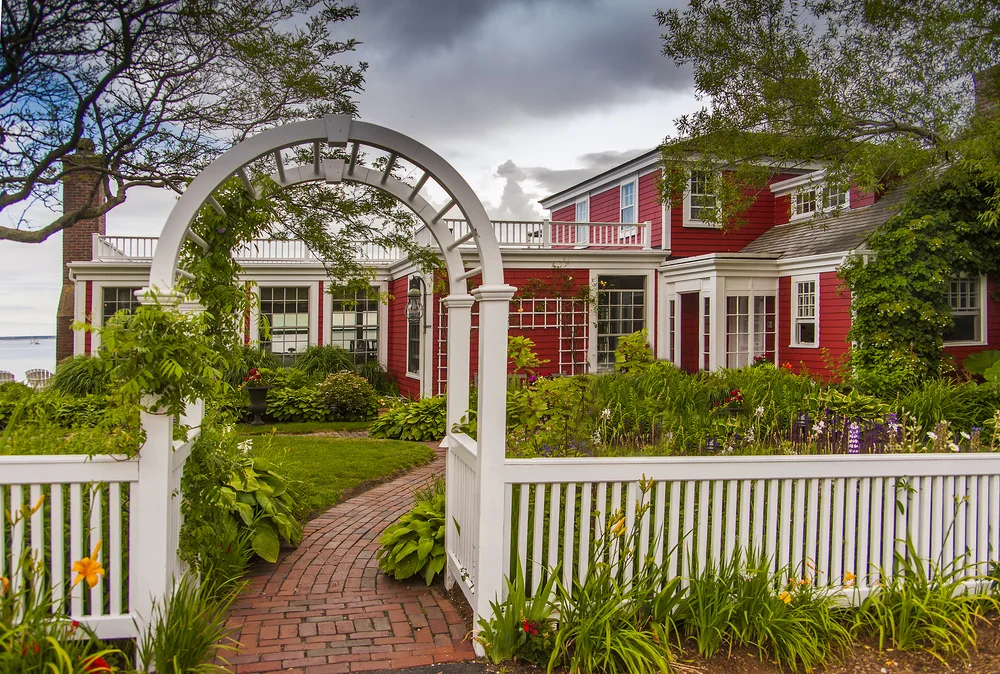
Christian Delbert/Shutterstock
Looking at the differences between a motel vs hotel vs inn, there’s plenty to compare and contrast. Take a look at the most frequently asked questions other travelers had to learn more about these types of lodging!
Is an inn better than a hotel?
Inns aren’t necessarily better than hotels, but they can offer a more distinctively local touch for a similar price to hotels. Inns offer a more personalized experience than hotels with comfy rooms and historic or locally-themed decor that feels homey.
Hotels may be larger and a bit more luxurious than inns, but inns have character that most hotels lack.
Why is it called a motel instead of a hotel?
Motel is short for “motor hotel” because guests enter their rooms directly from the parking lot. Each motel room opens up to the exterior parking lot, unlike hotels where rooms are entered from interior hallways.
Why are inns cheaper than hotels?
Inns aren’t always cheaper than hotels, but they can be much more affordable than 5-star hotels. Inns don’t offer as many luxury amenities or enhanced facilities on the property like some hotels do.
For example, you usually won’t find a gym, spa, or indoor swimming pool at an inn, but these are common amenities at a nice hotel.
Which is correct, hotel or motel?
Both hotel and motel are correct terms, but they refer to different things. Hotels are multi-story accommodations that offer guest rooms with interior entrances through a hallway.
Motels are 1- or 2-story accommodations that offer fewer guest rooms with exterior entrances. Motels are cheaper than hotels and offer fewer amenities for guests.
What is the purpose of a motel?
Motels are basic, cheap lodging for travelers who want a simple place to stay overnight. They are usually located on highways and don’t require travelers to drive into a city to access their lodging for the night.
Motels offer travelers affordable, no-frills lodging that can stretch a trip budget further or enable you to stop and rest overnight during a road trip.
So, What’s the Difference Between Motel vs Hotel vs Inn?
There are lots of differences between a motel vs hotel vs inn. Price, size/capacity, amenities, and overall guest experience are the main differences.
People stay in motels because they’re cheap and quick to access from the parking lot; people stay at inns because they offer a special, personalized and local touch in a beautiful, home-style setting.
Travelers stay in hotels because they’re offer a lot of overall value and tend to offer comfortable, clean lodging with extra amenities like gyms, spas, and pools.
Each type of accommodation has its own pros and cons. Motels may not feel as clean as inns and hotels; inns may feel outdated or not luxurious enough; hotels can be too expensive or feel impersonal.
When all things are considered, the comparison of motel vs hotel vs inn shows us that one type of lodging is not necessarily better than the others – they can all be useful in different travel circumstances.



